6 Best Practices for Call Center Coaching


Key Takeaways
- Good coaching is consistent and collaborative, not just a reaction to problems.
- It involves using real interaction data and AI tools to guide feedback and identify coachable moments.
- Set clear, measurable goals that align across teams to ensure fairness and track progress.
- Focus on soft skills with data-backed insights and structured role-play exercises.
- Coaching must be ongoing, with timely follow-ups and continuous plan adjustments.
Call center coaching closes gaps in agent skills and knowledge through targeted, one-on-one feedback so agents can improve how they handle customer interactions and build confidence to do better on future calls.
However, call center coaching differs from other jobs where a manager can observe how others are working, so it faces a major obstacle: visibility. Managers simply don’t have access to the majority of an agent’s work. In fact, traditional QA processes often review less than 2% of customer interactions. That’s the data gap, and it’s a defining feature of call center coaching.
Effective coaching in this environment isn’t just about experience or intuition. It’s about utilizing the right data. Without full visibility into agent interactions, coaching becomes guesswork. But with a full set of data about customer interactions, managers can deliver the right feedback that drives measurable improvement across the team.
Having seen hundreds of contact centers, we’ve experienced firsthand how systematic, AI-driven data collection and interpretation lead to better coaching outcomes. In this article, we’ve distilled six best coaching practices that our customers rely on to drive agent growth and make coaching more focused and impactful.
For several of these, we’ll highlight how customers are applying them using Level AI’s coaching tools to improve performance, workflows, and customer satisfaction.
But first, we discuss how coaching is most successful when it’s built on unbiased and consistent data — something that’s only possible when every customer interaction is captured and analyzed.
Why Coaching Is Only as Good as the QA Behind It
The best coaching starts with strong quality assurance. QA tells you where call center agents are succeeding, where they’re struggling, and what needs to be addressed in a coaching session. In other words, the quality of your coaching depends directly on the quality of your QA process.
Traditionally, call center quality management relied on manual methods. This meant selecting a small number of calls at random and listening to them all the way through. While this approach might catch some important moments, it’s extremely time-consuming. That means 97–99% of customer conversations often go unheard.
With such a small sample size, it’s hard to catch consistent performance trends or recurring issues. Evaluators might miss key patterns in customer complaints or service gaps. And because the sample is so limited, agents may sometimes feel that the feedback they’ve received is based on rare or one-off mistakes and not their usual performance.
Manual QA also introduces bias. Analysts and managers may bring their own opinions or assumptions into the process, or weigh recent calls more heavily than older ones. This can lead to inconsistent scoring across the team and a coaching process that feels unfair or incomplete.
But now with AI, we have the tools to evaluate and understand (in natural language) all interactions an agent has with customers, which opens up the door to a massive amount of QA data you previously just couldn’t get practically.
This gives teams a full picture of agent performance, uncovering insights that were previously hidden due to time and resource limits.
AI-powered call center software analyzes 100% of conversations, giving managers and coaches complete visibility into how call center agents are doing. It flags key interactions, highlights meaningful KPIs, and shows which conversations deserve a closer look. This ensures no major issues (or valuable coaching moments) slip through the cracks.
It also makes QA more consistent and fair. Unlike humans, AI applies the same rules and rubrics to every call, helping eliminate personal bias or inconsistent scoring. Every agent is evaluated by the same standard, resulting in more accurate performance assessments.
And by handling the heavy lifting of call review, AI frees up QA teams to focus on what matters most: effective call center coaching. Instead of spending hours listening to calls, evaluators can use AI scores to zero in on the conversations that really need attention. This leads to more focused feedback, more productive coaching sessions, and ultimately a better customer experience.
Best Practices for Call Center Coaching
Across hundreds of contact centers, we’ve seen that the most effective coaching programs share a common set of practices. These teams don’t just rely on instinct; they use tools like conversation analytics, auto-scoring, and contextual insights drawn from customer sentiment analysis, agent behavior, and resolution paths. Together, these help coaches deliver more targeted, constructive feedback that drives real improvement.
1. Make Coaching a Habit, Not a Reaction
One of the most important things a contact center can do is make coaching a regular, ongoing part of the agent experience. We've found that when agents don’t receive consistent feedback, they often feel disconnected and disengaged, especially in remote work environments. Without regular interaction, it’s easy for agents to feel isolated, which can lead to lower motivation, reduced productivity, and eventually, higher turnover.
The lack of in-person contact can also cause misunderstandings. Agents might misinterpret instructions or feedback, which affects their ability to perform well. On the other hand, when contact center coaching is part of a continuous learning culture, call center agents are more likely to feel supported and valued, which also reduces agent turnover. Regular check-ins can reinforce that the company is invested in their success, making them more likely to stay and grow within the organization.
It’s also important to consider how coaching is framed. If it only happens when something goes wrong, it can feel like a punishment. But when it happens routinely, it becomes part of the work rhythm, focusing on improvement rather than correction.
To keep coaching engaging, consider adding gamified elements like leaderboards, badges, or team challenges. When broader issues arise that affect the whole team, use group sessions that focus on collective improvement without singling anyone out.
Finally, make coaching collaborative. Work with agents to create action plans they believe in and can commit to. Ask questions, listen to their perspective, and acknowledge that performance can be affected by factors outside of work. A human approach goes a long way toward building trust and making one-on-one coaching effective.
2. Ground Coaching in Real Interaction Data
The strongest coaching is grounded in observable performance. That’s why it’s important to base your feedback on actual customer conversations, using recordings, transcripts, and performance data to guide each session. It’s evidence for your recommendations and highlights coachable moments, so you can guide them accordingly.
Such data points also provide key metrics like AHT, FCR, CSAT, and script adherence at the individual level. These allow you to spot patterns, measure progress, and make coaching decisions without needing to guess.
AI-powered contact center automation tools make this process more effective by analyzing 100% of your customer interactions. They’re able to identify customer sentiment, intent, and resolution outcomes, providing a consistent view of how each agent is performing while keeping all the information centralized and easy to navigate.
For example, each Level AI call center analytics dashboard links directly to coaching-related metrics and KPIs, making it easy to identify coaching opportunities and track agent progress without switching tools or digging through reports.
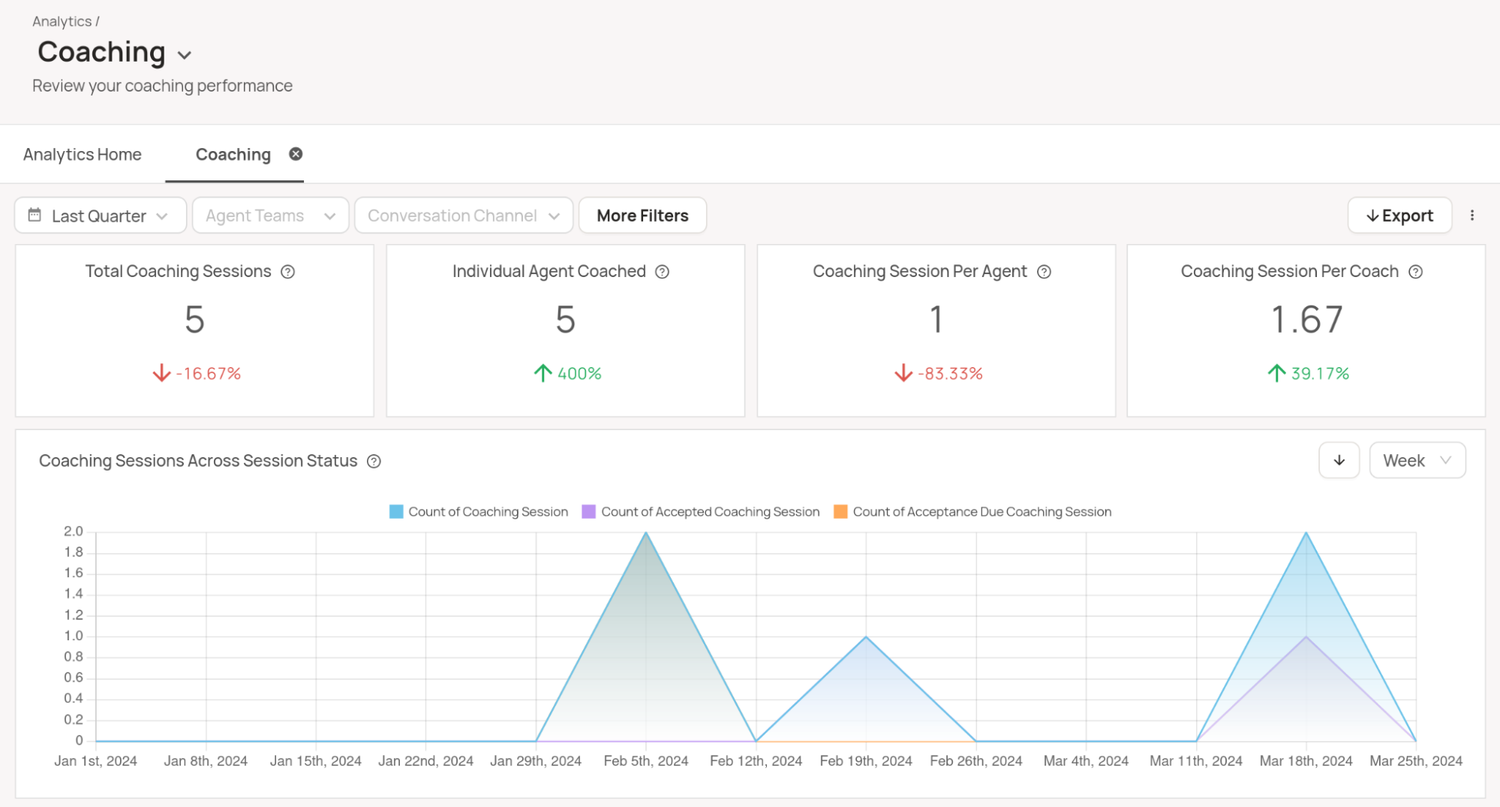
Or, after reviewing a particular customer conversation, you can launch a coaching session directly from the dashboard, jumping straight into a performance discussion with context in hand.
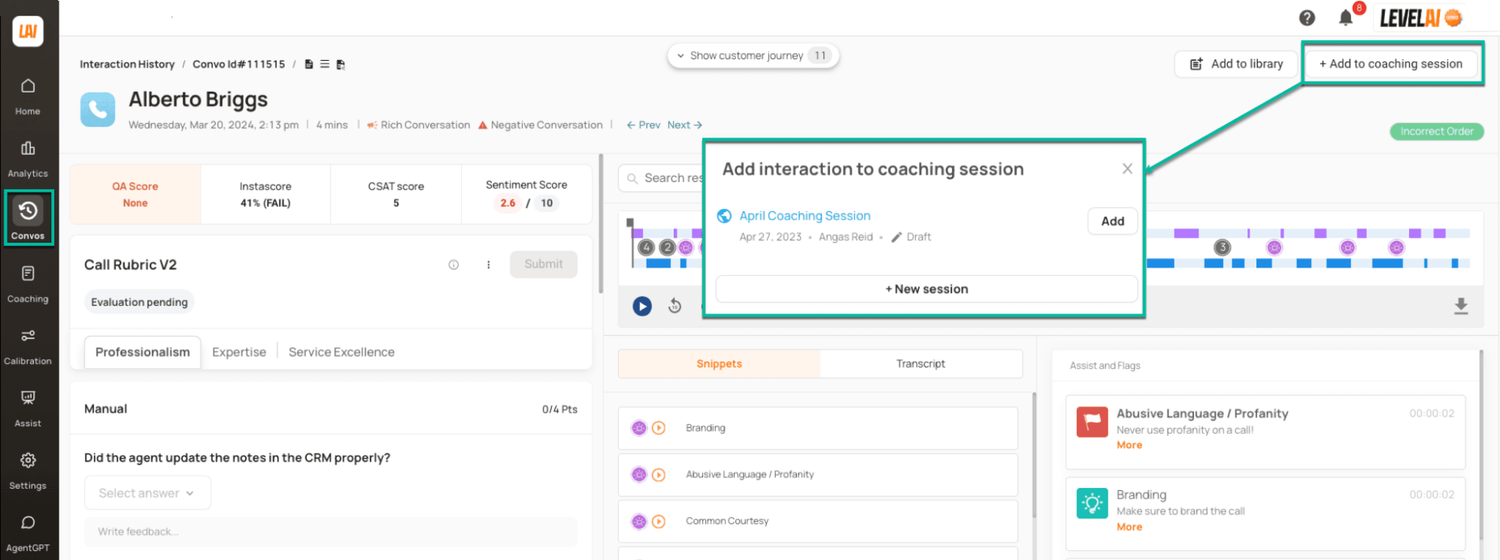
The Agent Coaching screen captures everything from session notes and follow-up actions to performance stats and coaching history.

It also tracks overall coaching activity, including how often agents are coached, what the outcomes are, and how individual performance evolves over time. You can share this view with agents, team leads, and others, while our call center real-time reporting generates analytics that show coaching effectiveness.
3. Set Clear Expectations and Goals
Before meeting with an agent, have clear and measurable goals defined with numbers and data. Coaching this way yields precise results and helps agents rapidly close performance gaps and develop requisite skills.
Also, make sure your goals are aligned with other teams to ensure agents are held to the same standards across the organization. You want to build fairness into the coaching process to ensure customers receive a consistent experience.
For example, rather than instructing an agent to merely handle the problem the first time around, set a concrete target like increasing first call resolution by 5–10% over the next month. Specific numbers help call center agents track progress and give coaches a baseline to measure against in future sessions.
To make goal-setting easier and more structured, we recommend using coaching templates. Level AI, for instance, offers predefined templates for various coaching scenarios, such as weekly 1:1s or quarterly reviews (you can also create your own). These templates automatically pull in current performance scores, such as quality assurance metrics and agent auto-scores (on the left side of the screenshot below), and provide space to define new goals and track progress.
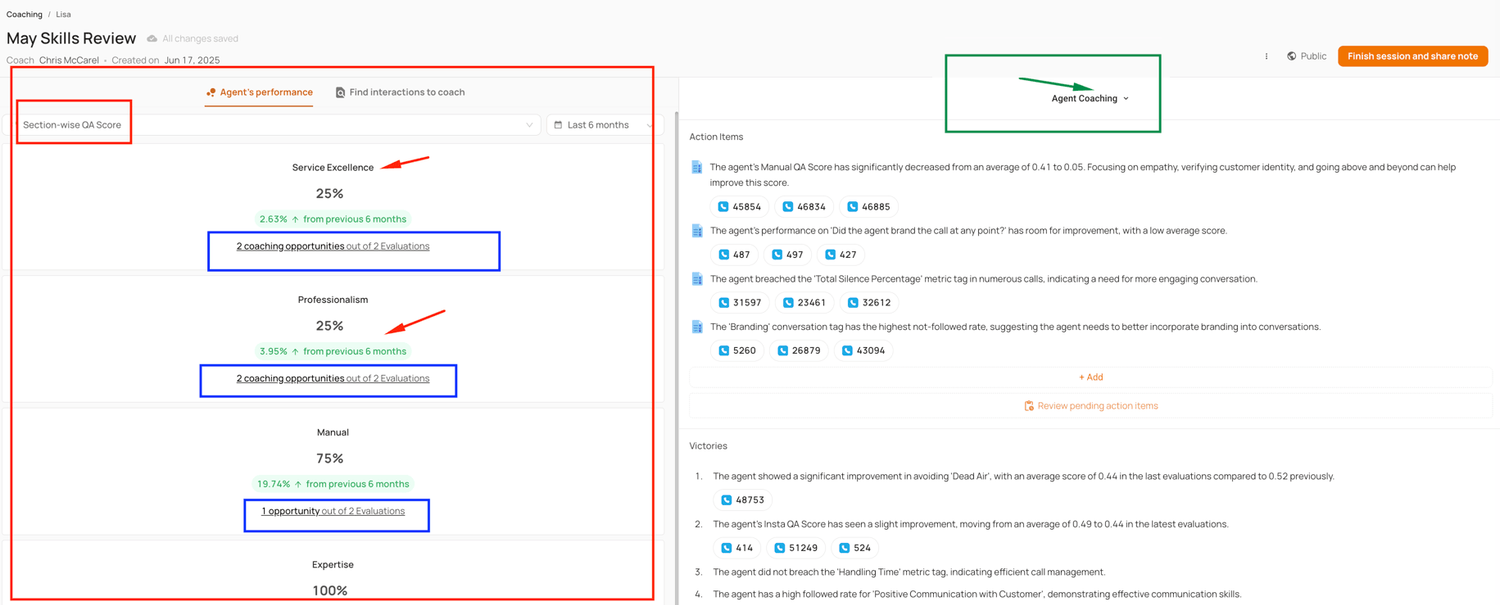
These help coaches run data-driven sessions with clear goals and action items, making it easy to track progress from one session to the next.
Coaches can also give agents access to their own dashboard to encourage accountability and ownership of their development.
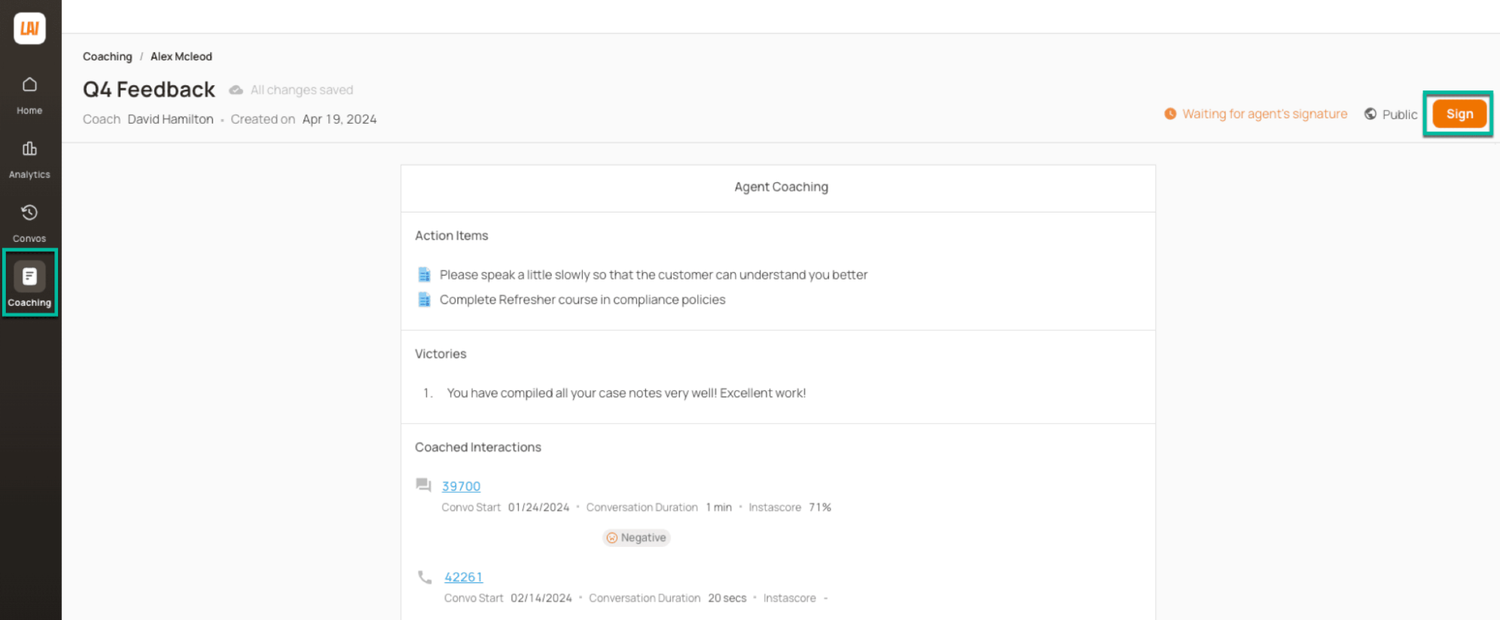
This gives agents visibility into their goals, past sessions, and progress, helping them stay engaged between coaching sessions and take an active role in improving their performance.
4. Focus on Soft Skills Development
Soft skills like empathy, active listening, clear communication, and problem-solving go a long way in helping call center agents build trust, defuse tense situations, and leave customers with a positive impression, even when things don’t go perfectly.
But soft skills can’t be improved without visibility into how agents are actually performing. By analyzing call recordings and customer interactions, contact center leaders can identify where agents may be struggling with tone, clarity, or connection. These insights create an opportunity for targeted post-call coaching strategies that go beyond basic instruction.
One proven strategy is to run interactive workshops and role-playing sessions that reflect real customer scenarios, especially ones involving frustration or conflict. These exercises let agents practice responding to difficult situations in a safe environment, building both confidence and competence over time.
Customer feedback tools and conversation analytics software make it easier to spot soft skill gaps. For example, Level AI’s InstaScore uses speech analytics to score every conversation automatically based on predefined quality assurance rubrics. It gives each interaction a percentage score, so managers can quickly see how well an agent performed against key criteria such as greeting the customer appropriately, maintaining a professional tone, and providing a clear resolution.

These rubrics break soft skills down into observable behaviors, making constructive feedback more actionable. And because every score is linked to specific moments in the interaction (whether in a call or chat), it’s easy for coaches to show agents exactly what worked and what didn’t.
Level AI’s coaching templates go even further by leveraging an agent’s InstaScores to highlight precise coaching opportunities. For instance, if an agent’s InstaScore in “Professionalism” is trending low, the system flags that area for improvement. As call center agents apply feedback and improve, their scores rise; over time, fewer coaching prompts appear, allowing managers to track and highlight progress.
5. Use Real-Time Insights to Spot Performance Gaps as They Happen
Monitoring live calls is one of the most effective ways to stay on top of agent performance. By observing conversations in progress using call quality monitoring tools, contact center managers can identify issues like script deviations, poor tone, or broken workflows as they happen. This, in turn, helps them decide whether follow-up coaching is necessary, without interrupting the flow of operations.
AI-powered coaching tools are specifically designed for live guidance, processing large amounts of speech data to provide managers with instant feedback on how calls are going in terms of customer sentiment and agent performance.
This lets call center managers spend less time searching for issues and more time addressing them effectively (through one-on-one coaching) after the call. For example, our Real-Time Manager Assist displays a live dashboard of all ongoing conversations with customers, and provides key indicators like who’s the agent speaking with, sentiment, agent InstaScore, likelihood of conversion, and the interaction’s most prominent coachable moments so far (e.g., whether the call is dragging on, if the agent sounds uncertain, or if they’ve recommended an appropriate solution).
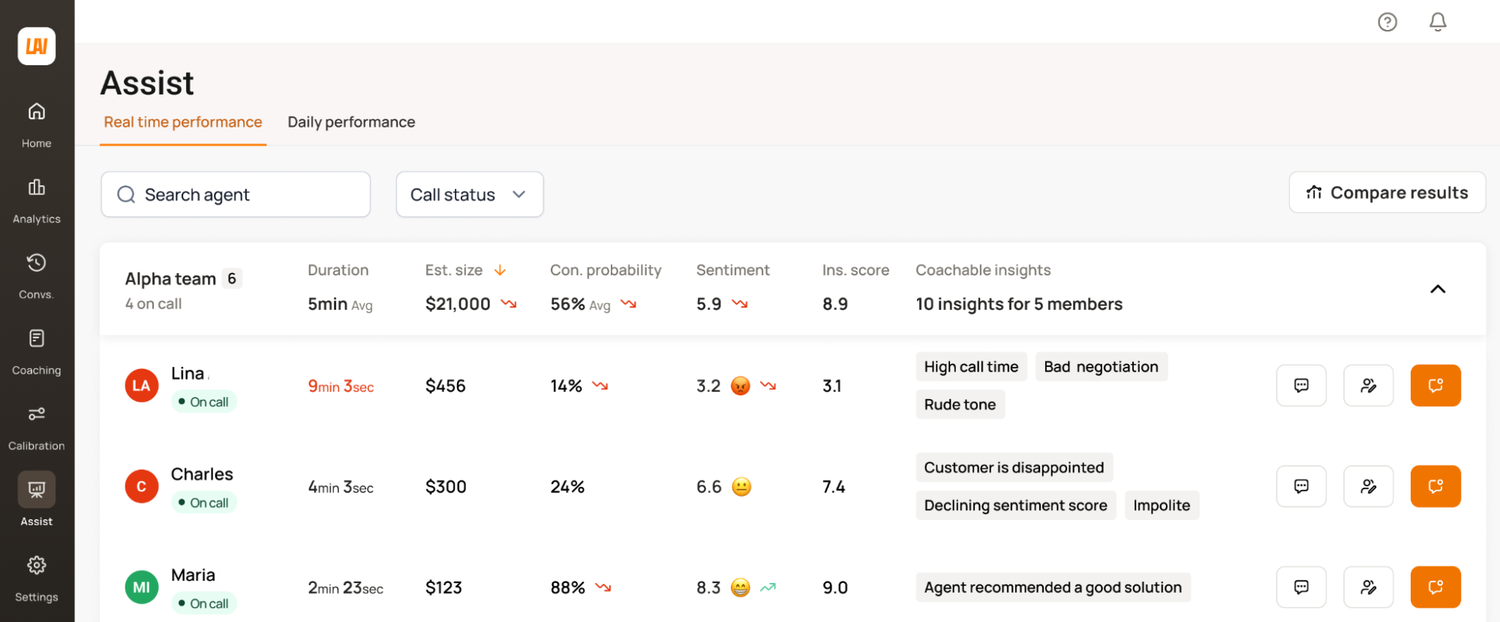
The KPIs of our call monitoring software link directly to supporting evidence, such as transcripts or deeper metrics, so call center managers can drill down to understand why a score was given and to possibly provide better post-call support:

A more automated way to support agents is through an agent-assist solution that uses speech analytics to detect customer intent and proactively display the relevant answers on screen. This reduces the pressure on call center agents to search for information mid-call, helping them stay focused on resolving the issue at hand.
Level AI’s Real-Time Agent Assist displays relevant answers for agents as they’re being discussed, and features:
- A main feed with action hints, warnings, and FAQs.
- Resources from ticketing and knowledge systems.
- Search functionality (AgentGPT) to help agents find additional information without long holds or long periods of dead time.
The search feature uses automation to fill the search bar with queries matching the current conversation and summarizes information from internal sources:
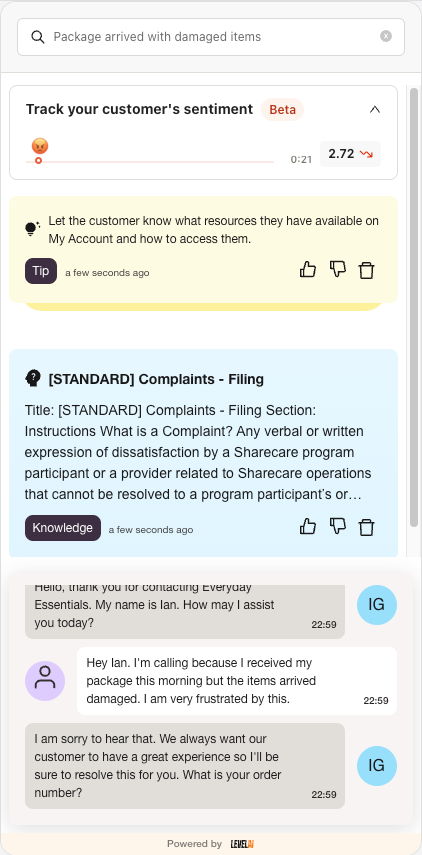
By giving agents contextual guidance during live calls, Real-Time Agent Assist helps them navigate complex situations without needing to search for answers mid-conversation or to escalate. This can be confidence-boosting, help reinforce best practices in the moment, and contribute to a better overall customer experience through a potentially reduced average handle time.
6. Follow Up and Evolve the Coaching Plan
Call center agent coaching shouldn’t be a one-and-done activity. To be effective, it must be continuous, with regular follow-ups and adjustments. Without this, agents may not develop the skills needed to improve themselves steadily or keep up with changing customer expectations. They may also struggle to recognize their own weak points, especially if feedback is delayed, inconsistent, or vague.
Timely feedback is also really important. If too much time passes between coaching and follow-up, coaches lose the opportunity to reinforce good habits (or correct bad ones). Reviewing past mistakes isn’t enough; the best contact centers build coaching programs that also track progress and evolve with the agent.
High-performing call centers check in regularly (e.g., a week or two after the initial coaching session) to assess what’s working and where adjustments are needed. This iterative approach helps agents (even top performers) refine their techniques and ensures coaching drives long-term results and call center efficiency.
Coaching templates make this process easier by keeping things organized and consistent. They let you track goals, carry over unfinished tasks, and see progress over time, so call center agent coaching stays clear, regular, and useful.
The best programs also focus on improving the coaches themselves. Successful teams regularly review performance and coaching techniques, evaluating not only what’s being taught, but how it’s being delivered. This includes evaluating the clarity of communication, the coach’s ability to motivate, and whether their guidance leads to improved outcomes.
Transform Coaching From Gut Feel to Measurable Impact
Most call centers still rely on sporadic reviews and subjective feedback. Level AI gives you the tools to coach based on real data, covering every conversation, across every agent. Build a coaching program that’s consistent, targeted, tied to results, and leads to better customer retention.
Book a free demo today and see how data-backed, contact center coaching improves agent performance from day one.
Keep reading
View all





